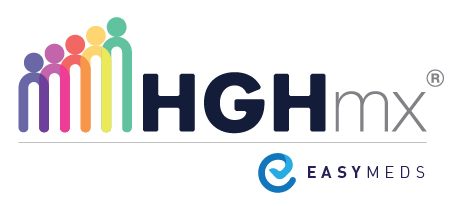Ever heard of Growth Hormone (GH), and wondered why it’s such a big deal for your little one’s growth? Well, GH is like the secret superhero of your child’s body. Produced by the pituitary gland, this unassuming hormone wears many capes – from being the chief architect of your child’s growth to being the mastermind behind their learning and memory skills. Here we’ll dive into GH deficiency in children and the lifelong impact it has on them.
Think of GH as the director of a movie called ‘Growing Up’. It calls “action” on the growth of long bones in their arms and legs, making sure your kiddo shoots up just right. It’s also the personal trainer for their muscles, helping them get stronger as they explore the world around them. Plus, it even has the tricky job of managing body fat – a role we all can appreciate!
But GH doesn’t stop at physical growth. It’s also the mentor for your child’s brain, guiding their learning, memory, and emotional responses. So, when your little one remembers the lyrics of their favorite song or figures out a puzzle, it’s GH cheering them on from behind the scenes.
In short, GH is incredibly important for your child’s growth and development. It’s like the silent guardian, ensuring they grow up healthy, smart, and strong. If GH is lacking, it could mean a rocky road ahead. But don’t worry, with early detection and the right help, every child can enjoy their growing up journey to the fullest. So let’s dive in and learn more about this superhero hormone!
The Importance of GH for Children’s Development
Physical Development: How GH Contributes to Bone and Muscle Growth
GH is the master builder of your child’s body. It stimulates the liver and other tissues to produce a protein called Insulin-like Growth Factor 1 (IGF-1). Together, GH and IGF-1 activate the growth plates at the ends of your child’s bones, helping them lengthen and your child grow taller.
But GH doesn’t stop at height. It also promotes muscle mass by stimulating the uptake of amino acids, the building blocks of proteins, into muscle cells. This helps your child gain strength and coordination as they explore their environment, crawl, walk, and eventually run!
Cognitive Development: GH’s Role in Brain Development and Function
GH is not just about physical growth; it’s also about brain power. Research shows that GH receptors are present throughout the brain, meaning this hormone has direct effects on brain function. GH is known to regulate neuron function, promote the formation of new connections between neurons, and even protect brain cells from damage.
These actions are crucial for your child’s cognitive development, including learning, memory, and problem-solving skills. So, when your child learns a new word or solves a tricky puzzle, remember to thank GH!
Emotional and Psychological Development: The Impact of GH on Mood and Behavior
GH’s role in your child’s development extends beyond the physical and cognitive. Emerging evidence suggests that GH may influence mood and behavior. For instance, low levels of GH have been linked to increased anxiety and depression in children. On the other hand, normal GH levels help maintain a positive mood and good psychological well-being.
In a nutshell, GH is a crucial player in your child’s overall development. It ensures your little one grows up not only physically strong but also mentally sharp and emotionally balanced.
The Consequences of GH Deficiency in Children
Short Stature: Definition and its Implications
In the world of pediatrics, ‘short stature’ refers to a child who is significantly shorter than their peers of the same age and sex. This isn’t about being the last one to hit a growth spurt – it’s when a child’s height is below the 3rd percentile, meaning 97% of their peers are taller.
Having a short stature due to GH deficiency can feel like constantly trying to keep up, both literally and metaphorically. It can impact a child’s ability to participate in physical activities and sports, making them feel less capable or different from their friends.
Mental Effects of Short Stature in Childhood:
Self-Esteem and Self-Worth Issues
Height is often associated with strength, competence, and attractiveness. Children with short stature may internalize these societal perceptions, leading to feelings of inadequacy. They may question their worth and abilities, leading to low self-esteem that can persist into adulthood.
Social Isolation and Feelings of Being Different
Children want to fit in, and being noticeably shorter can make a child feel conspicuously different. They might struggle with social isolation, as their peers may not understand why they’re different, leading to unintentional exclusion. These experiences can lead to feelings of loneliness and a sense of not belonging.
Academic Challenges due to Perceived Incompetence
Children with short stature may face academic challenges, not because they lack intelligence, but because they (and sometimes others) perceive themselves as less competent. They may be hesitant to participate in class, fearing ridicule or failure, which can affect their academic performance and hinder their learning potential.
In summary, GH deficiency and the resulting short stature can have profound effects on a child’s life, way beyond just their physical height. But remember, these challenges are not insurmountable. With understanding, support, and appropriate medical intervention, every child can reach their full potential.
The Social Implications of GH Deficiency in Children
Bullying: The Prevalence of Bullying Towards Children with Short Stature
Children with short stature are often targeted by bullies, who exploit physical differences to exert power and control. Studies have shown that short children are more likely to be victims of bullying, with their height being a primary focus (source). In fact, appearance-targeted bullying, which includes targeting a child’s size or height, is a common form of bullying (source).
Long-Term Psychological Effects of Bullying
The experience of being bullied can have long-lasting impacts on a child’s mental health. It’s not just about the immediate hurt; bullying can lead to anxiety, depression, and low self-esteem that persist into adulthood (source). It’s crucial to recognize and address bullying early to minimize its effects.
Peer Relationships: Challenges in Forming and Maintaining Friendships
Children with short stature may face challenges in forming and maintaining friendships. They might feel different or excluded, leading to social isolation. This sense of not belonging can have a profound impact on a child’s emotional well-being and development.
Participation in Sports and Extracurricular Activities: Potential Limitations and Feelings of Inadequacy
Participation in sports and extracurricular activities is a significant part of childhood, contributing to physical fitness, skill development, and social interaction. However, children with short stature may feel limited in their ability to participate in certain activities due to their height. This can lead to feelings of inadequacy and exclusion, impacting their confidence and self-esteem.
In summary, the social implications of short stature in childhood are far-reaching, affecting various aspects of a child’s life. But with support, understanding, and appropriate interventions, these challenges can be navigated successfully. Every child, regardless of their height, deserves to grow up feeling valued, included, and capable.
The Long-Term Effects of GH Deficiency in Children
Career Challenges
Potential Biases in Hiring and Promotions
Adults with short stature may face biases in the workplace. Despite equal qualifications and abilities, they might be overlooked for hiring or promotions due to unconscious biases associating height with leadership potential and competence.
Perceived Lack of Authority or Competence
Height can influence perceptions of authority and competence. Short-statured adults may find themselves fighting stereotypes that undermine their professional capabilities, leading to a struggle to establish authority and credibility in the workplace.
Personal Life
Dating and Relationships: Potential Challenges and Biases
When it comes to dating and relationships, short stature can play a role due to societal biases and preferences. Adults with short stature may experience challenges in the dating world, where height is often a factor in attractiveness, especially for men.
Social Interactions: Navigating a World Designed for Average Height
The physical world is often designed for those of average height, making everyday tasks more challenging for short-statured adults. From high shelves in supermarkets to countertop heights at home, navigating a world not built for their size can be a daily challenge.
Confidence and Self-Worth: The Lingering Effects of Childhood Experiences
The psychological impact of being short statured can extend into adulthood, with lingering effects on confidence and self-worth. The experiences of childhood – such as bullying, social isolation, or feelings of inadequacy – can continue to affect self-perception and emotional well-being in adult life.
In summary, being short-statured can have long-term effects that extend beyond childhood. However, it’s important to remember that these challenges do not define the worth or potential of an individual. With the right support, understanding, and resilience, short-statured adults can lead fulfilling and successful lives.
Recognizing and Addressing GH Deficiency in Children
When to be Concerned: Recognizing Signs of Potential GH Deficiency in Children
As a parent or caregiver, it’s crucial to be aware of the signs that might indicate a potential GH deficiency in your child. These could include a slower growth rate compared to their peers, a decrease in the rate of growth, or a height significantly below the average for their age and sex. Remember, it’s not about comparing your child to others, but rather noticing a significant deviation from typical growth patterns.
The Role of a Pediatric Endocrinologist
Expertise in Diagnosing and Treating GH Deficiency
If you suspect your child may have a GH deficiency, a Pediatric Endocrinologist is the specialist you need. They have specialized knowledge and expertise in diagnosing and treating hormone-related conditions in children, including GH deficiency.
Importance of Early Intervention
Early intervention is key in managing GH deficiency. The sooner it’s diagnosed and treatment begins, the better the outcomes for your child. This includes not just their physical growth, but also their emotional well-being and quality of life.
Diagnostic Tests and Growth Charts
How They Work and Their Significance in Tracking a Child’s Growth
Diagnostic tests for GH deficiency can include blood tests, imaging tests, and growth hormone stimulation tests. Alongside these, growth charts are a vital tool in tracking your child’s growth. These charts plot your child’s height and weight over time, allowing doctors to compare their progression with typical growth patterns.
The Role of Growth Charts in Identifying Deviations from Typical Growth Patterns
Growth charts are crucial in identifying any deviations from typical growth patterns. If your child’s height falls significantly below the average range for their age and sex, it could indicate a potential GH deficiency. However, remember that growth charts are just one tool in diagnosis, and any concerns should be discussed with a Pediatric Endocrinologist.
In summary, recognizing and addressing GH deficiency requires vigilance, knowledge, and the right medical support. If you have any concerns about your child’s growth, don’t hesitate to reach out to a healthcare professional. Your child’s health and well-being are always worth prioritizing.
Treatment Options for GH Deficiency in Children
Growth Hormone Therapy
How it Works and Its Potential Benefits
Growth hormone therapy is the primary treatment for GH deficiency. It involves daily injections of a synthetic version of growth hormone. The aim is to stimulate growth and help the child reach a height within the normal range for their age and sex. The benefits can be significant, including improved height, bone density, and muscle mass, as well as a potential positive impact on energy levels and psychological well-being.
Considerations and Potential Side Effects
While growth hormone therapy can offer substantial benefits, there are considerations and potential side effects to be aware of. These can include pain or skin reactions at the injection site, headaches, and joint pain. In rare cases, more serious complications can occur. It’s important to discuss these considerations with your child’s doctor to make an informed decision about treatment.
Psychological Support
The Importance of Counseling and Therapy for Children with GH Deficiency
Alongside medical treatment, psychological support is crucial for children with GH deficiency. Children may struggle with feelings of difference, low self-esteem, or anxiety related to their condition. Counseling or therapy can provide a safe space to express these feelings and learn coping strategies.
Building Resilience and Coping Strategies
Building resilience and teaching coping strategies is a key part of supporting a child with GH deficiency. This can involve helping the child understand their condition, fostering a positive self-image, and providing tools to handle potential challenges such as bullying or social isolation.
In summary, treating GH deficiency involves a combination of medical and psychological approaches. By addressing both the physical and emotional aspects of the condition, we can help children with GH deficiency lead fulfilling lives.
Conclusion
Growth hormone (GH) deficiency is a condition that can have lifelong implications, affecting not just a child’s physical growth but also their emotional well-being and quality of life. This underscores the importance of early detection. Recognizing the signs of GH deficiency and seeking professional help as soon as possible can make a significant difference in the child’s outcomes.
However, a diagnosis of GH deficiency is not a limitation on a child’s potential. With the right support and treatment, children with GH deficiency can lead fulfilling, successful lives. Growth hormone therapy can help address the physical aspects of the condition, while psychological support can equip children with the resilience and coping strategies they need to navigate any challenges they may face.
In the end, it’s important to remember that every child is unique, and their worth is not defined by their height or any medical condition they might have. With understanding, compassion, and the right medical care, we can help children with GH deficiency thrive and reach their full potential.







